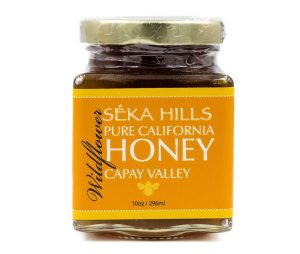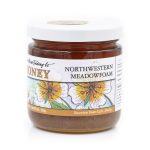Excerpt from Ari’s Top 5 enews
Exceptional dark caramelly honey from the hills of northern California
True varietal honey is one of the best examples I can offer of the beauty and benefit that my relationship with traditional food—food as it has been for most of human history—has given me. Honey, for me growing up, was sweet but simplistic. For a lot of folks, it still is. Pasteurized honey in the supermarket is to Séka Hills’ honey what American singles are to farmhouse cheddar. I’m not a big sweets eater, but real honey has become an important part of my life. It brings me back to nature in the best possible way—different blossoms in different parts of the world yield totally different honeys; and even more surprisingly to someone with an industrial mindset, honey from bees feeding on the same flower, but in different parts of the world, will taste different too. Rosemary honeys I’ve had from the south of France taste drastically different from the ones I’ve had from Spain.
Honeys like these also remind me how interconnected we all are—the Séka Hills honey is a product of a collaboration between the native Yoche Dehe/Wintun people and longtime local beekeeper John Foster. Foster seems an ideal partner. The third generation to manage his family’s hives across the region, he cares deeply about both community and traditional beekeeping work.
Designer Jim Guerard, who did the label, has been working to help the tribe to move forward, caringly and effectively building on tradition in ways that are appropriate and viable for the age in which we live:
Many of the northern California tribes became nearly extinct by the early 20th century, and those that survived lost much of their language and culture. Tribes are struggling with reinvigorating their languages and customs; a daunting task to say the least. In Yocha Dehe’s case, they’ve been rebranding themselves (if you’ll excuse the phrase) and creating an identity as a 21st century people that, while looking forward, are striving to maintain their traditional values in everything they do.
Honey, like this wildflower honey from northern California, serves as an invitation to reconnect with the natural world. Varietal honeys are food at their best. Barely altered at all by human intervention, they are exceptional eating as is. Eat some with apples for Rosh Hashanah, on toast, on a Bakehouse Zinglish Muffin, or in your coffee. Or do what I do and eat a spoonful, straight from the jar, before I head out to run. However you have it, take a minute to reflect and appreciate all of what has gone into making it what it is.



